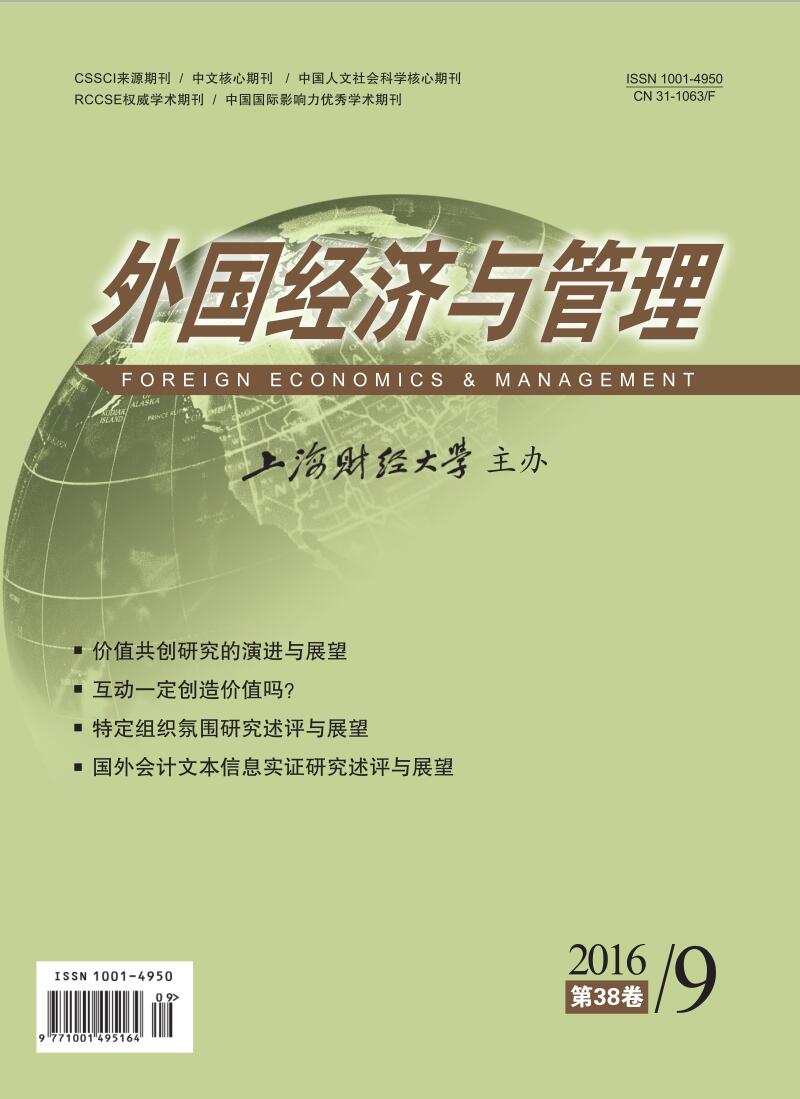管理者是否纳言将对员工后续建言和组织变革产生影响。首先基于说服理论阐述左右管理者纳言的一个重要原因是建言是否具有说服力;其次,构建了一个管理者纳言的说服过程模型,认为建言的说服力主要体现在建言者、信息、情境和管理者四个方面;再者,阐述了与这四个方面密切相关的一些具体因素(建言者的内群体成员身份、专业性和可信赖性,建言性质、是否提供证据和解决方法,建言时机、组织规范、权力距离以及管理者的情绪和认知)对于管理者纳言的影响。本研究有助于深化理解员工建言的结果,而且对研究管理者纳言的发生机制有较大的参考意义。
管理者为什么纳言?——基于说服理论的研究
摘要
参考文献
6 Beatty M J,Behnke R R.Teacher credibility as a function of verbal content and paralinguistic cues[J].Communication Quarterly,1980,28(1):55-59. DOI:10.1080/01463378009369358
7 Burris E R.The risks and rewards of speaking up:Managerial responses to employee voice[J].Academy of Management Journal,2012,55(4):851-875. DOI:10.5465/amj.2010.0562
8 Burris E R,Detert J R,Chiaburu D S.Quitting before leaving:The mediating effects of psychological attachment and detachment on voice[J].Journal of Applied Psychology,2008,93(4):912-922. DOI:10.1037/0021-9010.93.4.912
9 Burris E R,Detert J R,Romney A C.Speaking up vs.being heard:The disagreement around and outcomes of employee voice[J].Organization Science,2013,24(1):22-38. DOI:10.1287/orsc.1110.0732
10 Clugston M,Howell J P,Dorfman P W.Does cultural socialization predict multiple bases and foci of commitment?[J].Journal of Management,2000,26(1):5-30. DOI:10.1177/014920630002600106
11 Colquitt J A,Scott B A,LePine J A.Trust,trustworthiness,and trust propensity:A meta-analytic test of their unique relationships with risk taking and job performance[J].Journal of Applied Psychology,2007,92(4):909-927. DOI:10.1037/0021-9010.92.4.909
12 Detert J R,Treviòo L K.Speaking up to higher-ups:How supervisors and skip-level leaders influence employee voice[J].Organization Science,2010,21(1):249-270. DOI:10.1287/orsc.1080.0405
13 Deutsch M,Gerard H B.A study of normative and informational social influences upon individual judgment[J].Journal of Abnormal and Social Psychology,1955,51(3):629-636. DOI:10.1037/h0046408
14 Dunn J R,Schweitzer M E.Feeling and believing:The influence of emotion on trust[J].Journal of Personality and Social Psychology,2005,88(5):736-748. DOI:10.1037/0022-3514.88.5.736
15 Dutton J E,Ashford S J,O'Neill R M,et al.Moves that matter:Issue selling and organizational change[J].Academy of Management Journal,2001,44(4):716-736. DOI:10.2307/3069412
16 Eagly A H,Wood W,Chaiken S.Causal inferences about communicators and their effect on opinion change[J].Journal of Personality and Social Psychology,1978,36(4):424-435. DOI:10.1037/0022-3514.36.4.424
17 Gino F,Schweitzer M E.Blinded by anger or feeling the love:How emotions influence advice taking[J].Journal of Applied Psychology,2008,93(5):1165-1173. DOI:10.1037/0021-9010.93.5.1165
18 Grant A M,Ashford S J.The dynamics of proactivity at work[J].Research in Organizational Behavior,2008,28:3-34. DOI:10.1016/j.riob.2008.04.002
19 Grant A M,Parker S,Collins C.Getting credit for proactive behavior:Supervisor reactions depend on what you value and how you feel[J].Personnel Psychology,2009,62(1):31-55. DOI:10.1111/peps.2009.62.issue-1
20 Green S G,Anderson S E,Shivers S L.Demographic and organizational influences on leader-member exchange and related work attitudes[J].Organizational Behavior and Human Decision Processes,1996,66(2):203-214. DOI:10.1006/obhd.1996.0049
21 Hovland C I,Janis I L,Kelley H H.Communication and persuasion:Psychological studies of opinion change[M].New Haven,CT:Yale University Press,1953.
22 Isenberg D J.Group polarization:A critical review and meta-analysis[J].Journal of Personality and Social Psychology,1986,50(6):1141-1151. DOI:10.1037/0022-3514.50.6.1141
23 Johnson K J,Waugh C E,Fredrickson B L.Smile to see the forest:Facially expressed positive emotions broaden cognition[J].Cognition and Emotion,2010,24(2):299-321. DOI:10.1080/02699930903384667
24 Judge T A,Ferris G R.Social context of performance evaluation decisions[J].Academy of Management Journal,1993,36(1):80-105. DOI:10.2307/256513
25 Leung K,Brew F P,Zhang Z X,et al.Harmony and conflict:A cross-cultural investigation in China and Australia[J].Journal of Cross-Cultural Psychology,2011,42(5):795-816. DOI:10.1177/0022022110363474
26 Liang J,Farh J L.Promotive and prohibitive voice behavior in organizations:A two-wave longitudinal examination[A].Third International Association of Chinese Management Research Conference,Guangzhou,China[C].Guangzhou,China,2008.
27 Liang J,Farh C I C,Farh J L.Psychological antecedents of promotive and prohibitive voice:A two-wave examination[J].Academy of Management Journal,2012,55(1):71-92. DOI:10.5465/amj.2010.0176
28 Maynes T D,Podsakoff P M.Speaking more broadly:An examination of the nature,antecedents,and consequences of an expanded set of employee voice behaviors[J].Journal of Applied Psychology,2014,99(1):87-112. DOI:10.1037/a0034284
29 Milliken F J,Morrison E W,Hewlin P F.An exploratory study of employee silence:Issues that employees don't communicate upward and why[J].Journal of Management Studies,2003,40(6):1453-1476. DOI:10.1111/joms.2003.40.issue-6
30 Morrison E W.Employee voice and silence[J].Annual Review of Organizational Psychology and Organizational Behavior,2014,1:173-197. DOI:10.1146/annurev-orgpsych-031413-091328
32 Morrison E W,Wheeler-Smith S L,Kamdar D.Speaking up in groups:A cross-level study of group voice climate and voice[J].Journal of Applied Psychology,2011,96(1):183-191. DOI:10.1037/a0020744
33 Ng T W H,Feldman D C.Employee voice behavior:A meta-analytic test of the conservation of resources framework[J].Journal of Organizational Behavior,2012,33(2):216-234. DOI:10.1002/job.754
34 Nosek,J T.Group cognition as a basis for supporting group knowledge creation and sharing[J].Journal of Knowledge Management,2004,8(4):54-64. DOI:10.1108/13673270410556361
35 Parker S K,Williams H M,Turner N.Modeling the antecedents of proactive behavior at work[J].Journal of Applied Psychology,2006,91(3):636-652. DOI:10.1037/0021-9010.91.3.636
36 Perlow L A,Repenning N P.The dynamics of silencing conflict[J].Research in Organizational Behavior,2009,29:195-223. DOI:10.1016/j.riob.2009.06.007
37 Pornpitakpan C.The persuasiveness of source credibility:A critical review of five decades' evidence[J].Journal of Applied Social Psychology,2004,34(2):243-281. DOI:10.1111/jasp.2004.34.issue-2
38 Seibert S E,Kraimer M L,Crant J M.What do proactive people do? A longitudinal model linking proactive personality and career success[J].Personnel Psychology,2001,54(4):845-874. DOI:10.1111/peps.2001.54.issue-4
40 Tangirala S,Ramanujam R.Employee silence on critical work issues:The cross level effects of procedural justice climate[J].Personnel Psychology,2008,61(1):37-68. DOI:10.1111/peps.2008.61.issue-1
41 Wei L Q,Chiang F F T,Wu L Z.Developing and utilizing network resources:Roles of political skill[J].Journal of Management Studies,2012,49(2):381-402. DOI:10.1111/joms.2012.49.issue-2
42 Whiting S W,Maynes T D,Podsakoff N P,et al.Effects of message,source,and context on evaluations of employee voice behavior[J].Journal of Applied Psychology,2012,97(1):159-182. DOI:10.1037/a0024871
43 Whiting S W,Podsakoff P M,Pierce J R.Effects of task performance,helping,voice,and organizational loyalty on performance appraisal ratings[J].Journal of Applied Psychology,2008,93(1):125-139. DOI:10.1037/0021-9010.93.1.125
44 Yukl G,Seifert C F,Chavez C.Validation of the extended influence behavior questionnaire[J].The Leadership Quarterly,2008,19(5):609-621. DOI:10.1016/j.leaqua.2008.07.006
45 Zhang L,Deng Y L,Zhang X,et al.Why do Chinese employees build supervisor-subordinate guanxi? A motivational analysis[J].Asia Pacific Journal of Management,2015,32(3):571-826. DOI:10.1007/s10490-015-9419-y
46 Zhang L,Ji W,Tao J L,et al.Who shall leave? How CEO preference and power affect executive turnover in Chinese listed companies[J].Corporate Governance:An International Review,2011,19(6):547-561. DOI:10.1111/corg.2011.19.issue-6
引用本文
张龙, 李想. 管理者为什么纳言?——基于说服理论的研究[J]. 外国经济与管理, 2016, 38(9): 80–92.
导出参考文献,格式为:
上一篇:特定组织氛围研究述评与展望






 6228
6228  7851
7851

